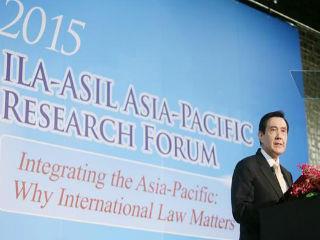Security issues in the South China Sea, including the land reclamation projects Beijing is undertaking, have recently captured the world’s attention. Several countries, including Brunei, Malaysia, the Philippines, Taiwan, Mainland China and Vietnam, claim parts or all of the South China Sea.

At opening ceremony of “2015 ILA-ASIL Asia-Pacific Research Forum” on May 26, 2015, Republic of China (Taiwan ) President Ma Ying-jeou shared the successful experiences of his administration in promoting peace in the region, first in the Taiwan Strait, then in the East China Sea and the South China Sea, also proposed the South China Sea Peace Initiative as a viable means of dealing with current issues in this region.
by
EBR
The United States
openly welcomed the initiative. "We, of course, appreciate Taiwan's call
on claimants to exercise restraint, to refrain from unilateral actions that
could escalate tensions, and to respect international law as reflected in the
Law of the Sea Convention," said State Department acting deputy spokesman
Jeff Rathke. Below
is the full text of the Initiative:
Over
the past few years, the parties concerned have continuously been at odds over disputes
in the South China Sea, increasing tensions in
the region and eliciting widespread concern in the international community. The
government of the Republic of China (Taiwan)
reiterates that, whether from the perspective of history, geography, or
international law, the Nansha (Spratly) Islands, Shisha (Paracel) Islands, ChungshaIslands
(Macclesfield Bank), and Tungsha (Pratas) Islands,
as well as their surrounding waters, are an inherent part of ROC territory and
waters. The ROC enjoys all rights over them in accordance with international law. This is indisputable.
Islands
in the South China Sea were first discovered,
named, used, and incorporated into national territory by the Chinese. The ROC
recovered the islands from Japan
after the Second World War. The San Francisco Peace Treaty, which entered into
effect on April 28, 1952, as well as the Treaty of Peace between the ROC and Japan which was signed that same day, together
with other international legal instruments, reconfirmed that the islands and
reefs in the South China Sea occupied by Japan should be returned to the
ROC. In the several decades since, the fact that the ROC owns and exercises
effective control over these islands has been recognized by foreign governments
and international organizations.
Since
President Ma Ying-jeou assumed office in 2008, the ROC has actively strived to
improve relations with mainland China.
Tensions in the Taiwan Strait have been
greatly reduced, and cross-strait relations continue to develop peacefully.
Meanwhile, President Ma proposed the East China Sea Peace Initiative in August
2012 to deal with disputes in the East China Sea as well as the sovereignty
issue concerning the Diaoyutai Islands. This initiative
not only helped alleviate friction in the region but also facilitated a
fisheries agreement signed by the ROC and Japan in April 2013 in accordance with the concept
that, even though sovereignty cannot be divided, resources can be shared. This
agreement, ending a 40-year-old fisheries dispute between the ROC and Japan,
has been widely recognized by the international community.
Similarly,
with regard to disputes in the South China Sea, the ROC government, upholding
the basic principles of safeguarding sovereignty, shelving disputes, pursuing
peace and reciprocity, and promoting joint development, is willing to exploit
resources in the South China Sea in
cooperation with the other parties concerned. It is also prepared to actively participate
in related dialogue and cooperation mechanisms, so as to resolve disputes
through peaceful means, safeguard regional peace, and promote regional
development. As this year (2015) marks the 70th anniversary of the
end of the Second World War, the countries surrounding the South
China Sea should heed the lessons of history and commit themselves
to advancing regional peace and prosperity. Therefore, in view of the rising
tensions in the South China Sea, the ROC, based on its successful peace-making experiences
in the East China Sea, hereby solemnly
proposes the South China Sea Peace Initiative, calling on all parties concerned
to:
1. exercise restraint, safeguard peace and stability in the South China Sea, and refrain from taking any unilateral
action that might escalate tensions;
2. respect the principles and spirit of relevant international
law, including the Charter of the United Nations and the United Nations Convention
on the Law of the Sea, peacefully deal with and settle disputes through dialogue
and consultations, and jointly uphold the freedom and safety of navigation and
overflight through the South China Sea;
3. ensure that all parties concerned are included in mechanisms
or measures that enhance peace and prosperity in the South
China Sea, e.g. a maritime cooperation mechanism or code of
conduct;
4. shelve sovereignty disputes and establish a regional
cooperation mechanism for the zonal development of resources in the South China Sea under integrated planning; and
5. set up coordination and cooperation mechanisms for such
non-traditional security issues as environmental protection, scientific
research, maritime crime fighting, and humanitarian assistance and disaster
relief.
The
ROC is willing to work with the other parties concerned to implement the
concepts and spirit of the South China Sea Peace Initiative in order to resolve
disputes and jointly develop resources, thereby making the South China Sea a “Sea
of Peace and Cooperation” similar to the East China Sea.




 By: N. Peter Kramer
By: N. Peter Kramer
